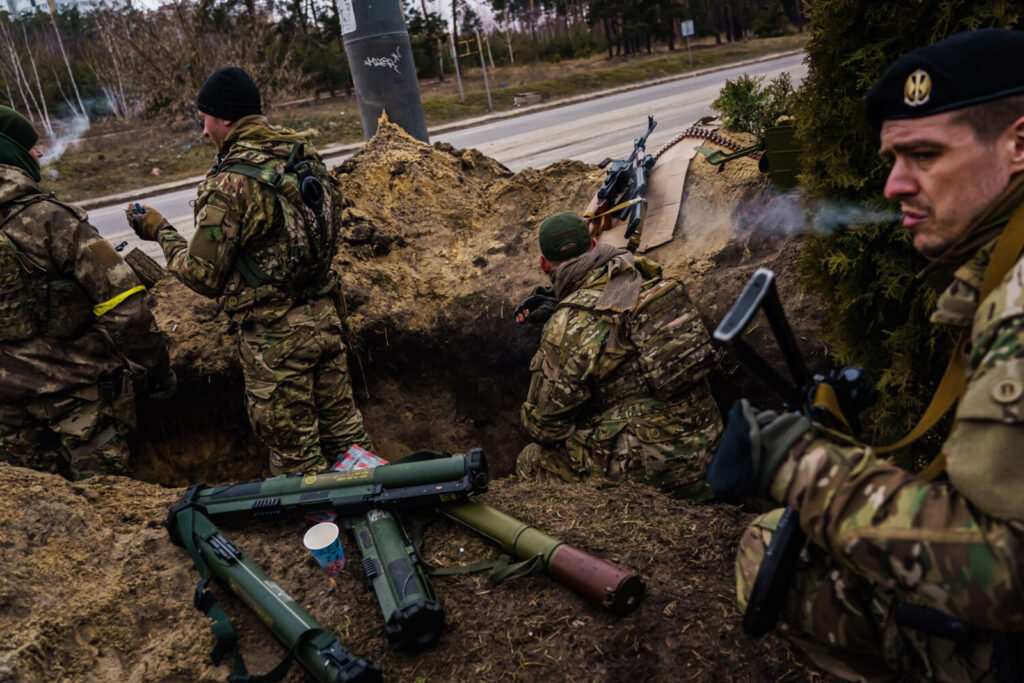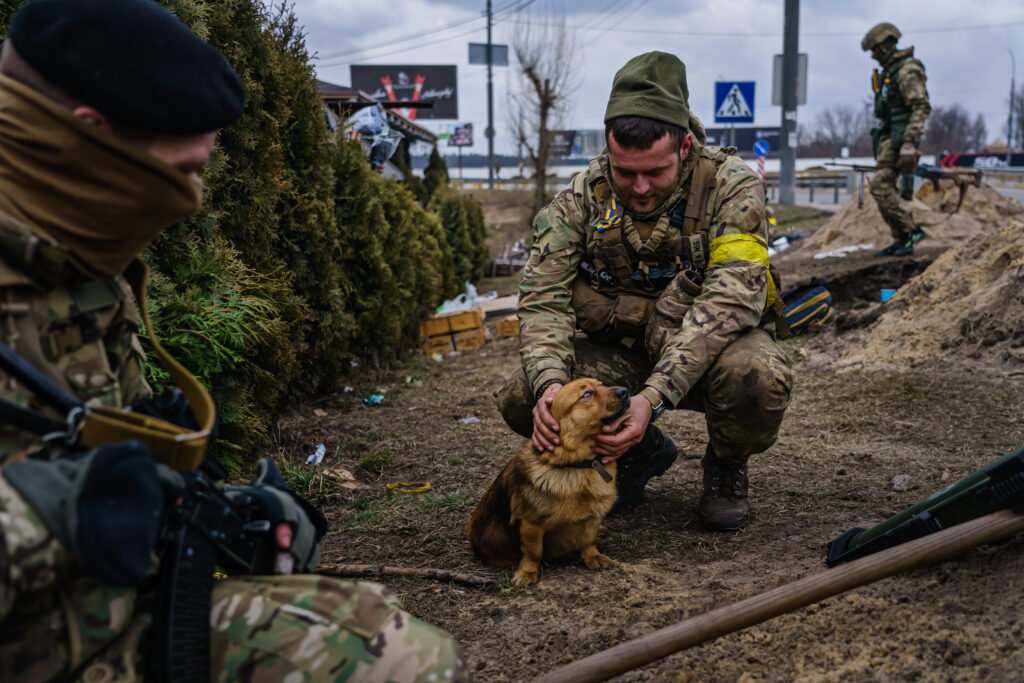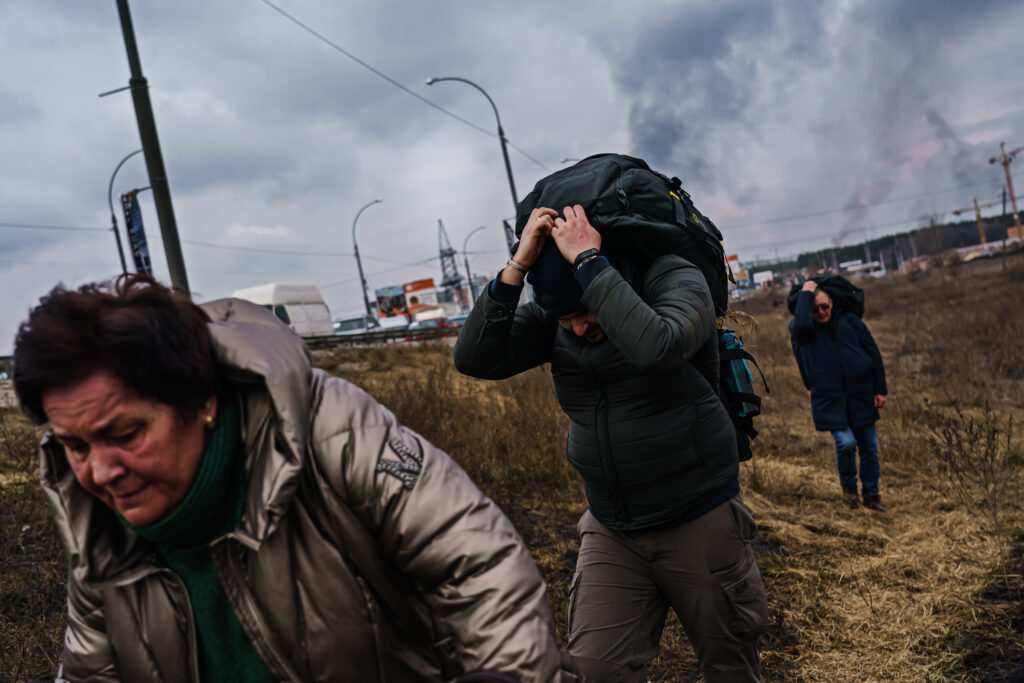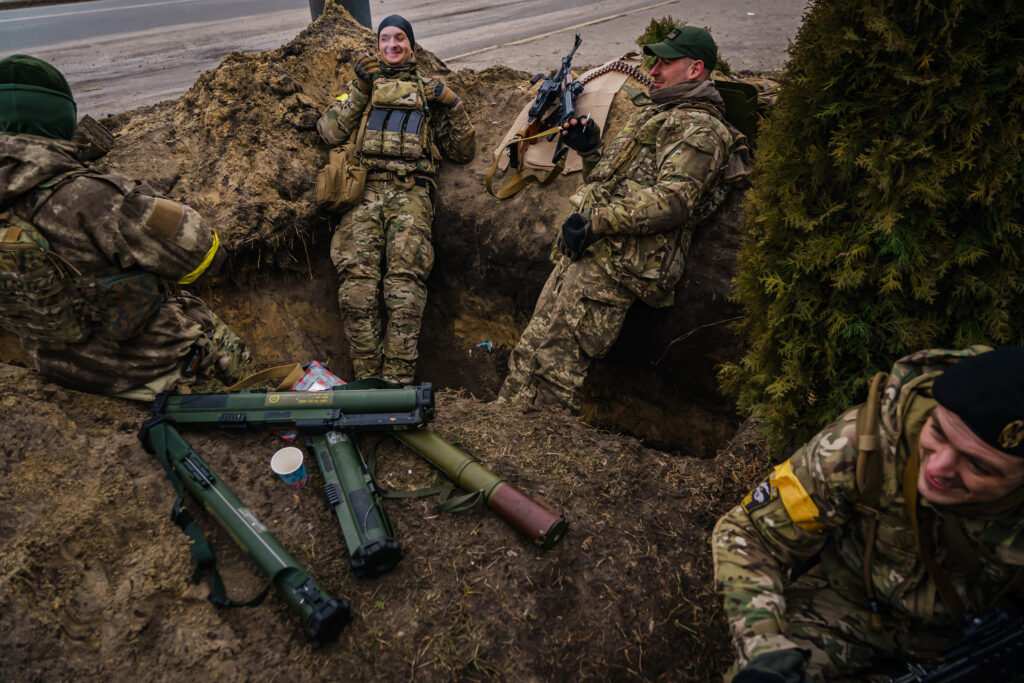Jackson is a singer. So, even though he was standing in a trench in this suburb northwest of Kyiv, even though a massive column of Russian soldiers and weaponry lay just a mile or so up the main road, it didn’t take much prompting from his friends in his Ukrainian army unit to goad him into song.
He laughed, leaned back, looked away for a moment and — just when it seemed he wasn’t going to do anything at all — launched into a creditable rendition of Nina Simone’s “Feeling Good”:
Birds flying high, you know how I feel
Sun in the sky, you know how I feel
Jackson’s voice rolled through the “-ow” in “know” with a guttural tinge. His fellow fighters cheered him on, right up to where the brass blast was supposed to sound. That’s when, as if on cue, the whistle-pause-boom of incoming mortars and artillery cut in.
The men ducked into the trench, hands scrabbling at the soil as they pressed themselves into the side. A beat later, one of them gave the all-clear, and they stood up, dusted themselves off and resumed the faux-relaxed chatter of soldiers waiting for their last stand.
Russian troops had tried for days to storm through Irpin from Hostomel Airport to the capital, Kyiv. The tsunami hadn’t yet come; the forces’ slow progress surprised the Ukrainians, who chalked it up to Russian ineptitude. But it was there, gathering force, collecting more tanks, armored carriers and other vehicles for the drive into Kyiv.
The first wave struck Bucha, a town just north of Irpin, where stiff Ukrainian resistance turned a highway into a charnel house of brown-singed armor and Russian dead. But then came that whistle-pause-boom, eviscerating houses and shearing power and water lines.
Irpin was spared then. Not anymore. On Monday, the long but inaccurate reach of artillery and mortars extended well beyond Irpin’s southern entrance, to the bridge blown up by Ukrainian forces to impede the Russian advance. Families still trickled out onto the P30 highway to Kyiv, many of them juggling an eclectic assortment of backpacks, cloth bags and trolleys, others tending to the very old or very young, explosions accompanying them all the way.
They were some of the last holdouts among Irpin’s 62,000 people. They spoke of Russian tanks in the streets, of the hurried exit past the bodies of neighbors felled by a shell during an attempted escape, of vicious fighting in Irpin’s quaint park.

At the roundabout on the southern edge of town, you couldn’t hear any of those skirmishes. Then again, it was hard to hear anything when the whistle-pause-boom played overhead.
The residents who kept emerging like apparitions on the smoke-filled highway dragged their luggage along asphalt, sand, grass, mud, down whatever path they thought would maximize their chances of making it through the maelstrom of projectiles — the Russian roulette version of a Sunday walk.
What do you do when the whistle-pause-boom comes comes your way and you’re in the open? It’s a numbers game. First you look for somewhere to hide, preferably in a side ditch with soil (it’s soft, so a shell burrows deep, with less chance of spraying shrapnel). Many people keep their eyes open, the calculations in their head almost visible as they process split-second aural data: How loud and close is the whistle? What’s its speed and frequency? How long’s the pause? Is the boom here? Is it safe to stand up?
Maybe I’m foolish, maybe I’m blind
Thinking I can see through this, and see what’s behind
Jackson, 28, continued singing, not missing a beat even when a barrage started up again at the line: “I’m only human after all — don’t put your blame on me.”
Jackson, whose real name is Jeka Stecenko, first saw combat in 2014, when Russian-backed separatists snatched parts of eastern Ukraine, igniting a conflict that has killed more than 14,000 people but that had — until Moscow’s full-scale invasion — simmered down to a few casualties per month. He joined a marine platoon, spending months exchanging the occasional sniper bullet and mortar round across the contact line that splits parts of eastern Ukraine.
After that, Jackson moved to Sweden to further his singing career. He built a new life, like most of the men in his unit of military veterans — men like Vladimir, an unassuming 30-year-old standing by a black sniper rifle, who had since become a clean-energy businessman. Like many of the soldiers interviewed, he gave only his first name for reasons of security or privacy.
When the invasion began 12 days ago, Jackson and the others from his old platoon got in touch and decided to form a sort of roving squad that, on Sunday, was attached to the ragtag collection of troops trying to defend Irpin.
They arrayed themselves in position not far from the southern roundabout, digging out trenches in the sidewalk lawn. Strewn about near them were machine guns, rocket-propelled grenade launchers and the bulky dumbbell of a British NLAW anti-tank missile.

For Vladislav, one of the platoon’s younger members at 26, who used to do remote work as an IT programmer with a company in Santa Monica, the fight felt different from 2014.
“Think of what Russians do. That didn’t change, although the scale is much bigger,” he said, his house less than a mile up the road from where he now stood vigil.
“What changed is that in 2014 we saw them as brothers — we weren’t ready for the fight. Now it’s no mercy: We’re ready to destroy them.”
Also, the 2014 war was confined to the east, more than a day’s drive from Kyiv, in a part of the country that a fair number of people had accepted would probably never return to Ukrainian government control. In many ways, Vladislav and his friends were unwanted fighters in an increasingly unpopular war; even after the 2016 mass demobilization in Ukrainian army ranks, a number of veterans never really gave up the fight, at least mentally.
They were even less appreciated in the east, where much of the population is ethnic Russian, members of the group that Russian President Vladimir Putin claims to be defending with the “special military operation” — the invasion — he launched Feb. 24.
“People were being bombed. Especially the older ones, who were affected by Russian propaganda, they said we were the ones shooting at civilians on the other side, that the war was only for oligarchs to make money,” Vladislav said.
He added that his father, who lives in the Russia-annexed province of Crimea, told him that TV channels in Russia claimed the Ukrainian government spent years attacking civilians living under the separatists, and that Putin came to punish them.
“Now? The attitude changed completely. My mother-in-law says, ‘Kill them all.’ All the people I know, even members of the opposition party that supports Russia, they’re now pro-Ukrainian,” Vladislav said, passing down a plastic container full of pelmeni, Russian dumplings, to Michael “Mig” Pestovsky, a 31-year-old captain in a beret and full uniform.
“Yeah, they say on Russian TV channels we eat Russian babies here,” Pestovsky said, chomping down on a pelmeni. Smiling, he said that he preferred vareneki — the Ukrainian version of the dish — but that the pelmeni he was having now were tasty, “because they’re filled with Russian meat.”
Pestovsky, a big rap fan who friends say occasionally posted videos of himself performing on Instagram, seemed relaxed, even jovial, despite the continuous fire overhead and the knowledge that the Russians were ever closer.

He cocked his ears at an explosion somewhere behind him, then brightened up and said: “Nasha.” Ours.
“I’m not saying it’s great to be back fighting,” he said, turning to look at those in the trench. “But with them, it’s great.”
Inside a nearby building commandeered as a headquarters, Marine Capt. Lymon, a tall man bristling with the hardware befitting the professional soldier he was, conferred with Vladimir Korotya, a 30-year-old deputy administrator from Bucha’s City Council. The two were in charge of coordinating the different squads here with other groups stationed elsewhere in town.
They made a mismatched pair: one blond and clean-shaven, Lymon, who returned last month from a military course in the U.S.; the other swarthy and bearded, Korotya, who opened a notebook full of pictures of women in bikinis and sketched out a map of Russian positions. He switched between a walkie-talkie, a map on his smartphone and the notebook as he discussed possible maneuvers with Lymon.
“I command my own personal army. Here we have territorial defense forces, we have airborne, we have marines,” he said, showing a reporter a picture of a sign in Bucha that read, “Welcome to hell.” He wanted “the Russians to see it.”
The enemy wasn’t succeeding as quickly as expected, he surmised, because they didn’t know the area. His soldiers, working in squad-sized groups, were nimble, able to maneuver faster than their adversaries and score hits while facing superior fire.
What about invading helicopters and aircraft?
“They’re using them, but they’re careful because we’re shooting them down,” he said.
The rat-a-tat-tat of sustained fire outside filtered through the windows — soldiers firing on a drone they spotted flying in the cloud-filled sky.
Around Korotya, his men were removing dirt from their shoes or adjusting their armor vests and weapons. To the side, one soldier cut thick bread slices, spooning orange pearls of Spets Posol caviar onto them — a gift from a resident, the supermarket tags still on the cans.

Lymon grabbed a slice and munched on it slowly. He looked drained, his blue eyes alert but languid. “All I can think about is that I need to shower,” he said.
By Monday, the Russians had taken half of Irpin, and the fight, he knew, was only going to get worse. The reality was that there were enough Russian troops to overwhelm what resistance the Ukrainians could muster.
“We’re going to try burn them. We’ll fight to the end. What choice do we have?” he said.
To one side stood Dmytro, 35, gazing at a picture of his daughter, 7-month-old Diana, on his smartphone. He was one of the few fighters who looked uncomfortable in their military uniforms, their demeanor showing they were unused to combat.
“I’m proud of my people. But I’m fighting for Diana,” he said. “It was a difficult choice. But better that she be without a father than without a future.”
Outside, the whistle-pause-boom sounded once more. Eight civilians were killed in Sunday’s barrage. Monday delivered another victim, a cyclist killed when a shell landed near the severed bridge past Irpin’s southern entrance. He lay on his side, his bicycle behind him, his face turned toward the twisted metal of the bridge that led to nowhere.
___
© 2022 Los Angeles Times Distributed by Tribune Content Agency, LLC



